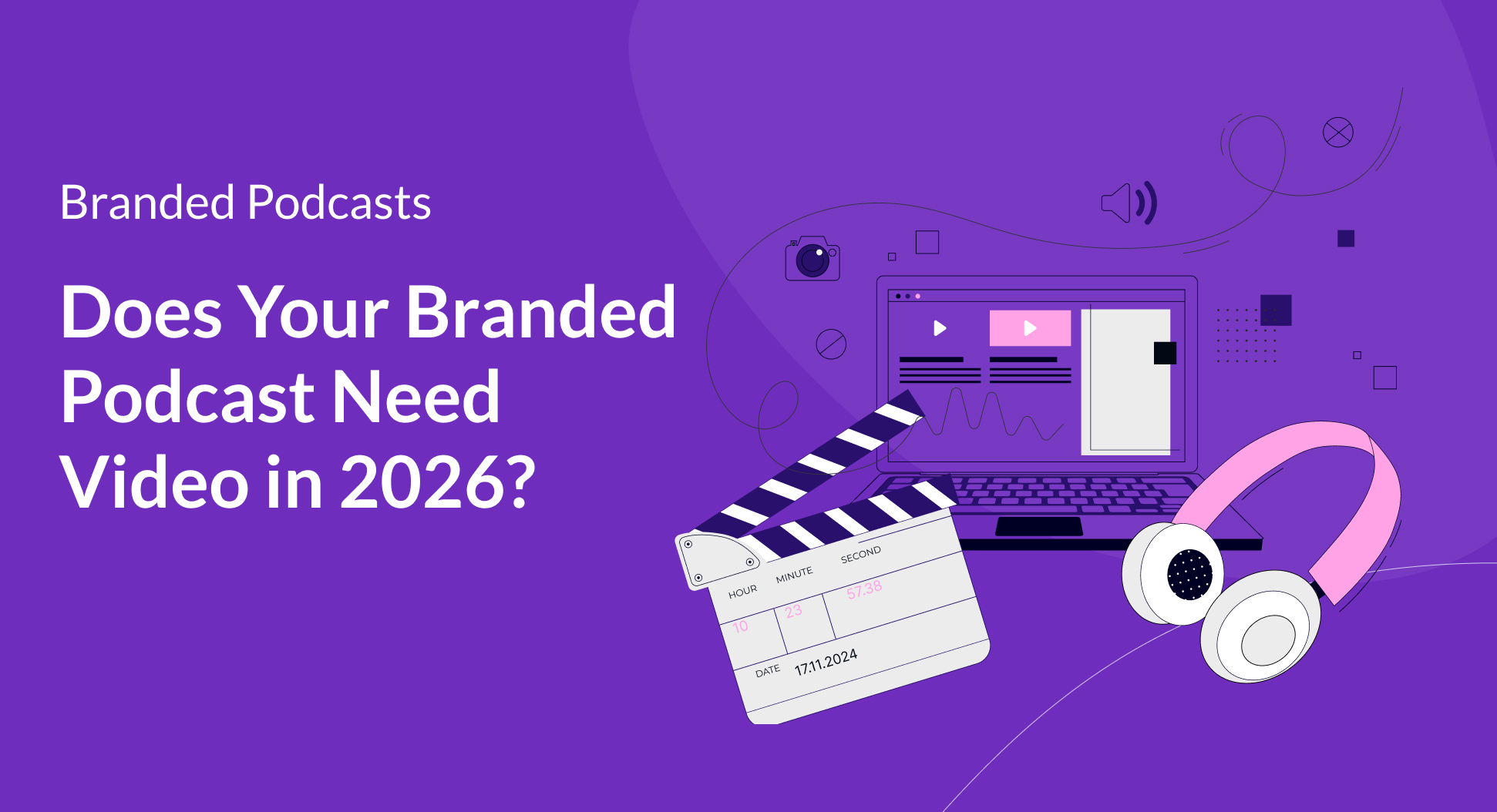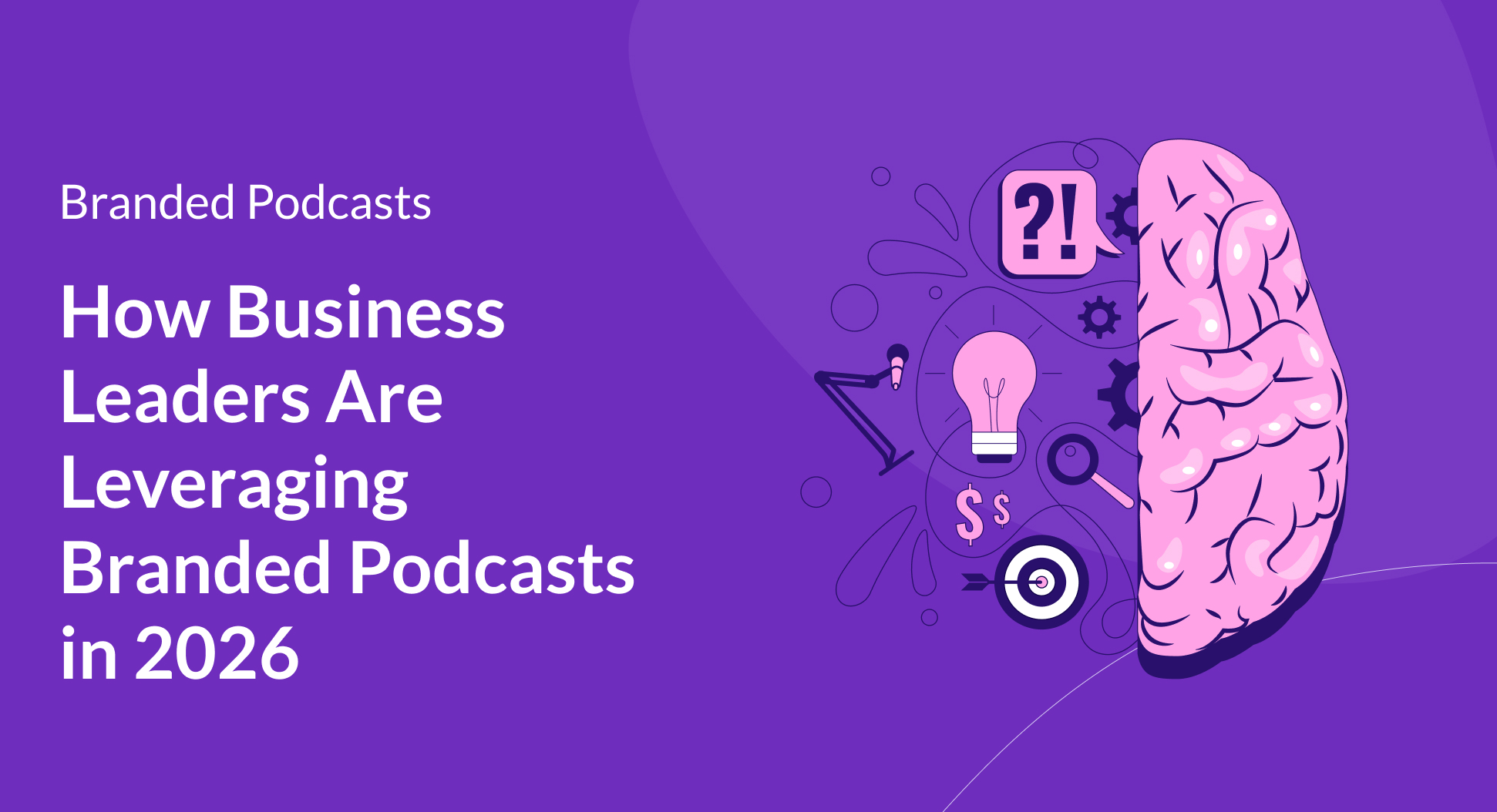Contents
So you’ve taken the first step and decided to create a branded podcast and want to outsource your production. Now what?
The number of moving parts associated with developing a podcast can be deceiving. Creating a well-produced show takes a lot of time and effort, and your brand needs to decide what elements you can handle in-house, and what you need help with.
But as seasoned audio experts, we’re here to help you better understand everything that goes into outsourcing your podcast. Check out our tips below.
Content creation, writing, and editing
Having great content is the foundation of having a great podcast. But as every marketer knows: great content takes time.
That time might be with research, planning, writing, producing, or even strategy. But either way, there’s no quick work around for developing a high-quality show.
Creating podcast content involves a few different steps:
- Research
- Writing
- Editing
Each of these steps takes time, and when it comes to podcasts, each element takes a different skill set.
While you and your brand are subject matter experts, writing and editing a script that will translate into great audio takes practice, and is a great place to bring in an experienced help.
If you’re writing the script yourself, here are a few key things to keep in mind.
Keep interviews natural
It can be tempting to write a script word for word. However, this strategy can backfire in interviews. If an interview sounds over-scripted, you risk it sounding robotic, and as much as you might wish you could, you can’t control how the interviewee will answer the questions. To keep it natural, we recommend using talking points and sending your guest the questions in advance.
Consult the host(s)
In a corporate setting, it's often not the host of the podcast who is doing the script writing. That’s why it's important that the person writing the script is consulting the host. You don’t want to run into a situation where the host wants changes right before going into a recording- it’s stressful for everyone!
Spend time on your show notes
When you publish your episodes, you also publish your shownotes along with it (the small blurb of text that appears below the episode in listening apps.) Make sure you have a strong description and title that will hook listeners and include any links you mention in the episode. You can also include key takeaways from the episode for potential listeners to convince them to listen.
Shownotes are just one aspect of your podcast that contribute to SEO performance so ensure the necessary time is dedicated to them.
Content when working with an agency
So what does the content creation process look like when outsourcing to a podcast agency?
When working with an agency or independent creator, it’s important to ensure that you come prepared. Ask yourself these questions in advance of a first meeting:
- Who is your ideal listener? Ask yourself why would they want to listen to this show. Your show needs to provide value to the listener, you’re making the show for them after all!
- What style will your podcast be? Will it be interview based, narrative, multi-story? Will the personality of it be fun and energetic, or serious? Listen to a variety of podcasts across genres to get an idea of what your show could sound like.
- What will the theme and topic of your podcast be? When it comes to podcasts, getting specific is important. Making a podcast about ‘finance’ sounds great, but you need to get more specific. A great answer to this questions would be, “a podcast about personal finance for people just entering the workforce who have questions about investing.”
- Is your target audience addressable? As a marketer this shouldn't come as a surprise, but your target audience needs to be addressable. Are you going to be able to get your podcast in front of the people you want to be listening to it?
The agency/freelancer will use your answers to create proposed look and feel for you show, including themes, potential titles and style. The more information you can provide - the better but you should also be able to rely on your agency to give you their opinions and insights too as experts in the field (they should also be doing their own research into your industry!)
If you’re looking to outsource the content creation of your podcast to an independent creator, look for a freelancer who specializes in writing podcast content. If you’re working with a full-service agency, they’ll cover the content writing and keep you looped in.
Here are the most popular places for finding freelance writers:
Guest sourcing and scheduling
One of the most overlooked, but important parts of creating a podcast is making sure you have your guests sourced and scheduled. People will tune into your podcast if you’re telling compelling stories that will educate and entertain.
Your show needs to be adding value, so find guests who bring stories, expertise, and insights to your show that will draw in listeners and keep them coming back.
But finding great guests, contacting them, pre-interviewing them, and finding a time to record can be a lengthy process. Here’s what the guest sourcing process might look like when working with an agency:
- The agency does research and compiles a list of proposed guests to review with you
- Once the guests have been approved, the agency begins cold outreach
- Once a guest agrees to be interviewed, often the agency will conduct a pre-interview, and a producer will use that information to draft an episode plan
- The agency will draft an episode plan for client review
- The agency will liaison with the guest and your team to find a time to record
Alternatively, you can also come to your agency with a list of guests that you know in advance that you’d like to have as a guest. From here the agency can handle communications with the guest or if you’d like to cover that, the agency can help to plan an episode around the guest’s expertise.
While guest sourcing may be doable for a podcast novice, it's time consuming. If you aren’t working with an agency, here are some options to consider for finding guests:
Insider Tip: Make sure you leverage your network to look for potential guests!
Post-production editing
Post-production and editing are steps in the podcast production process that most people choose to outsource. Unless you have experience with audio editing, there is a steep learning curve, and hiring a professional can make all the difference between an amateur and professional-sounding show.
Having low-quality audio is one of the biggest turn offs for potential listeners, and you want your brand’s podcast to come across as professional and high-quality. Agencies have dedicated team members who will meet with you to discuss music choice, editing type, and overall structure to achieve the sound you’re looking for.
If you’re planning to edit in-house, you can also take advantage of AI editing software. These softwares won’t replace a sound engineer and editor, but they can help you make cuts sound more seamless, and integrate music and transitional sounds:
Podcast hosting and distribution
Podcast hosting and distribution are one of the simplest parts of podcast production but that doesn’t take away from its importance. A podcast hosting platform is a place where you upload your episodes and shownotes to be distributed to all the podcast distribution platforms like Spotify,Apple Podcasts, and Google Podcasts.
But it doesn’t stop there, your podcast hosting platform is the home for your podcast, where you’ll be managing, growing, and measuring it. This is why selecting the right hosting platform for your brand is key.
If we’re going to be honest, the quality of podcast analytics available to marketers are pretty bleak but there are some podcast hosting and tech platforms working to solve this. We recommend looking for hosting platforms with a more robust analytics set to make it easier for you to measure podcast performance and track ROI. Here are some data points we recommend you make sure your hosting platforms provides:
Basic Analytics
- Downloads and Unique Listeners
- Total listeners
- Listener demographics
- Most listened to episodes
Advanced Analytics
- Episode consumption rates
- Built in trackable links
- Advanced listener demographics (city, age, gender)
- Popular listening times
- B2B Analytics (only provided by CoHost)
Some corporate hosting platforms include:
Quill Insight: You can outsource the process of uploading your podcast to your hosting platform of choice, although this is a service primarily offered by full-service agencies.
Marketing and social media
Now that you’ve created a great podcast, it’s time to share it with the world! You likely have an internal marketing team who handles all marketing strategies, but it can also be useful to outsource this final step.
As a marketer, this is probably the area you’re least likely to outsource. After all, marketing engaging content is your bread and butter.
You might consider using automatic scheduling tools or a CMS (content management system) to help you make sure all your podcast assets are going out as each episode launches. When choosing the right tools for your podcast workflow, it's also essential to understand the distinctions between CRM vs CMS for effective content and audience management. Here are a few to consider:
However, working with an agency can also be very beneficial in this regard. They have experts on their team who can help your podcast get on Apple’s New and Northworthys, be featured in podcast focused newsletters and publications, launch podcast advertising campaigns through audio-specific channels, and more!
If you’re handling all marketing in-house, we recommend you at least consult with your agency so they can provide some tips, tricks, and advice for growing a podcast.
Why work with a full-service podcast agency
While you can outsource the various aspects of your podcasts, there are many benefits to working with a high-end full service podcast agency. Podcast agencies are experts in transforming ideas into polished finished products that will resonate and add value for your listeners.
Additionally, you work with the same team the entire time, making communication seamless.
High-end agencies will often tailor solutions for your brand, so even if you’re only looking to outsource a few elements of your production, it's worth reaching out.
Here are some agencies we suggest:
- Quill
- StudioPod
- Sound That BRANDS
- JAR Audio
- Lower Street
- Content Allies
- Fame
- Beacon Digital
- Pacific Content
- The Podcast Haven
- FRQNCY
When it comes to outsourcing, it’s all about your level of expertise and how much time you can dedicate to your show. And ultimately, you need to make the choice that's best for you and your brand. We recommend agencies because they not only bring their extended expertise and experience to creating branded shows, but they also help your team save valuable time.
If you have any questions about outsourcing your branded podcast, chat with our team!






.png)

.png)




.png)
.png)
.png)
.png)